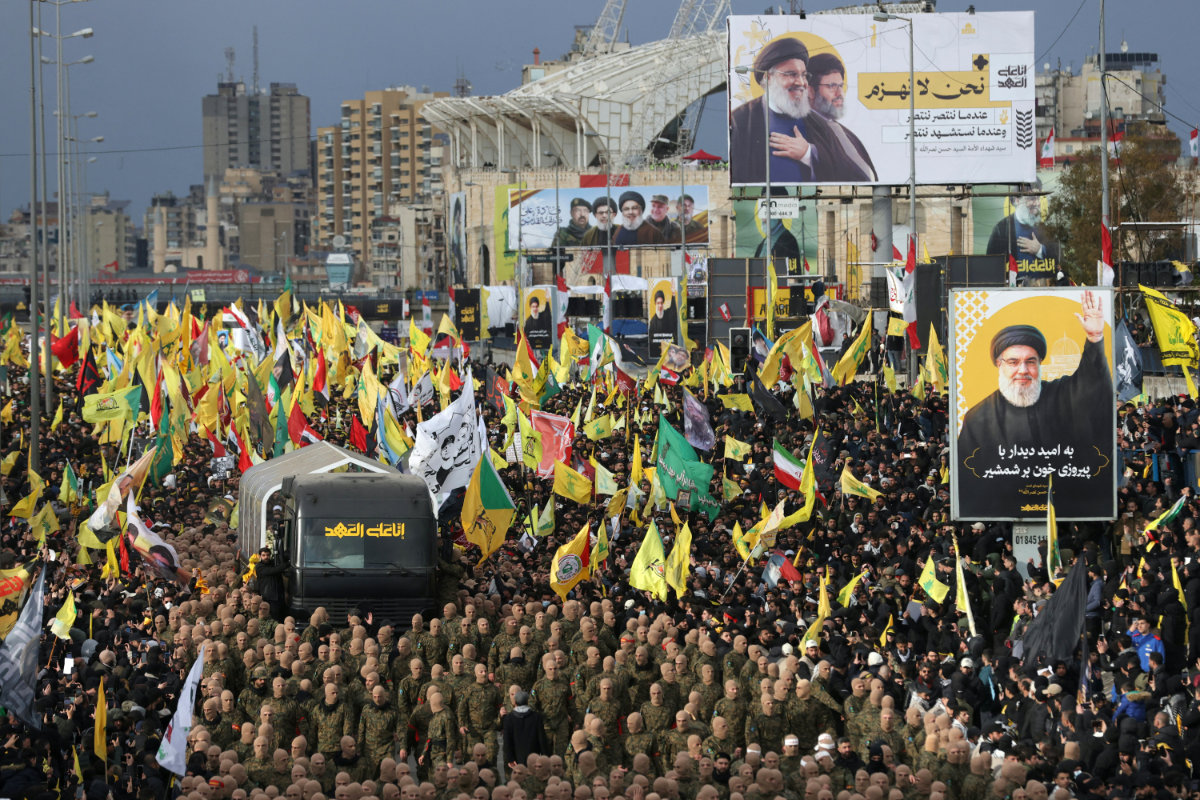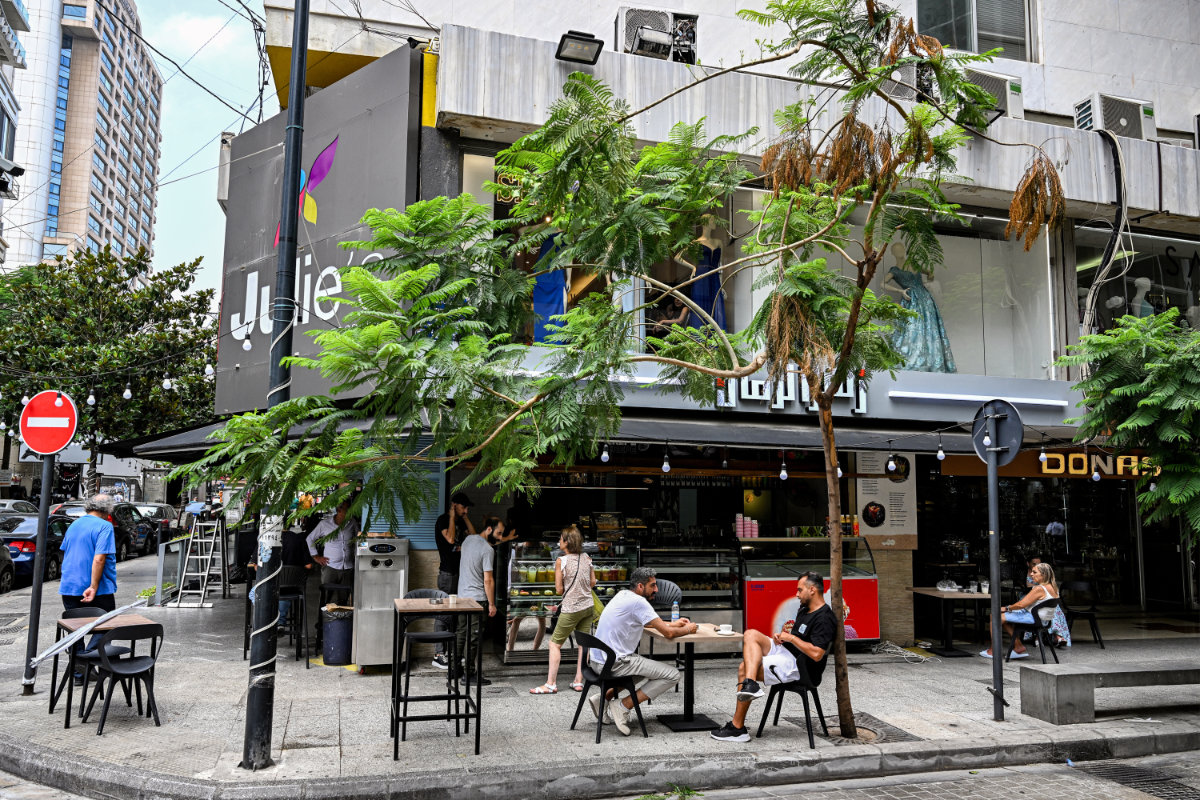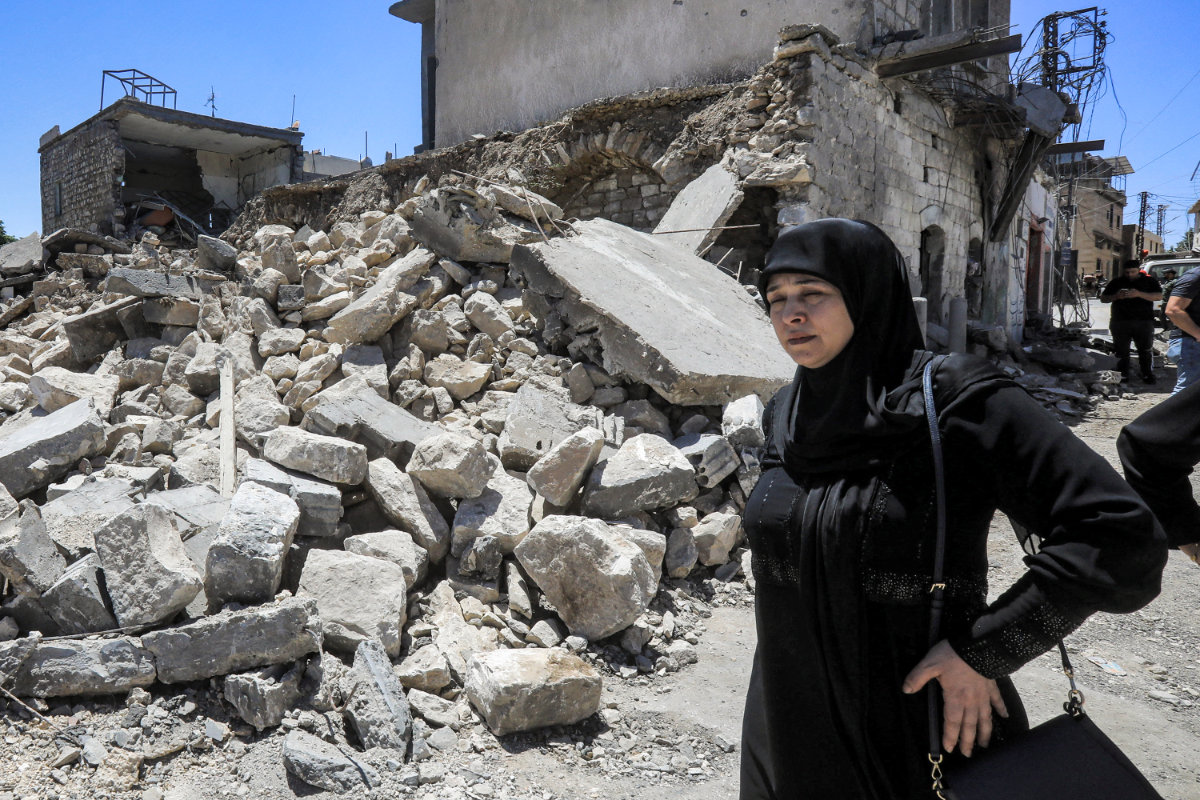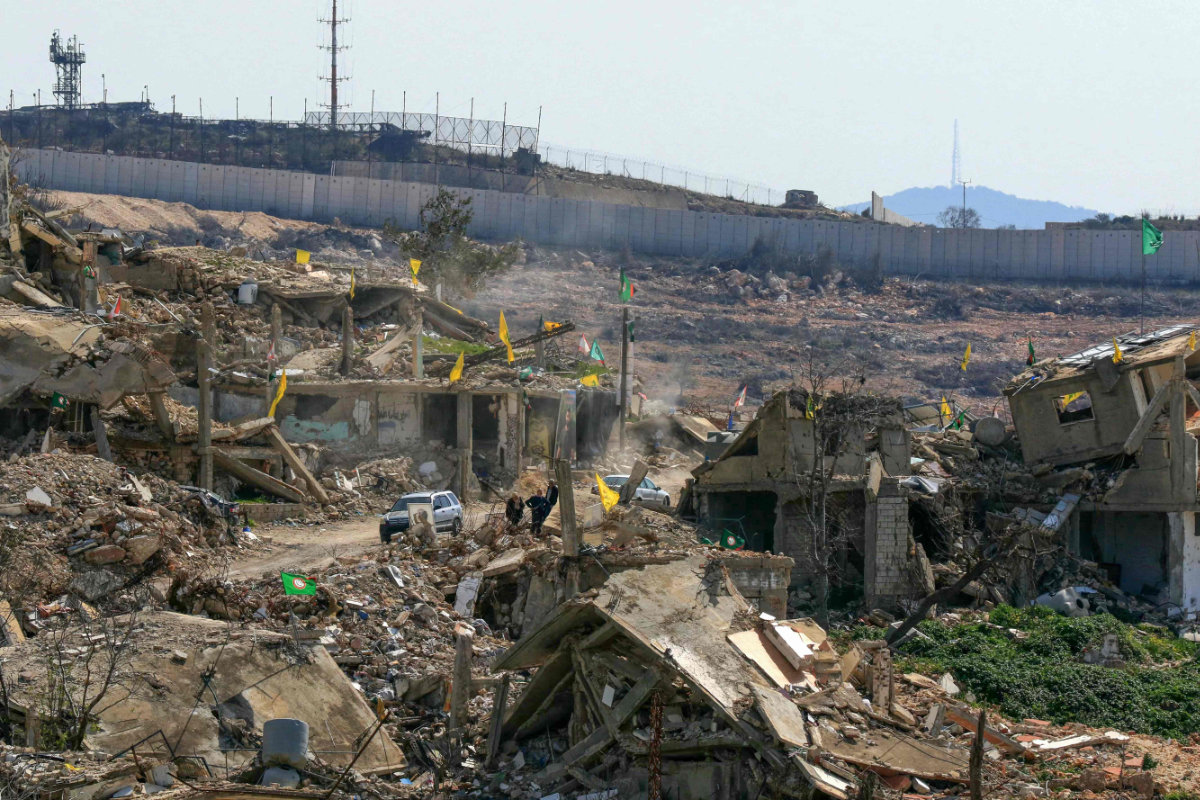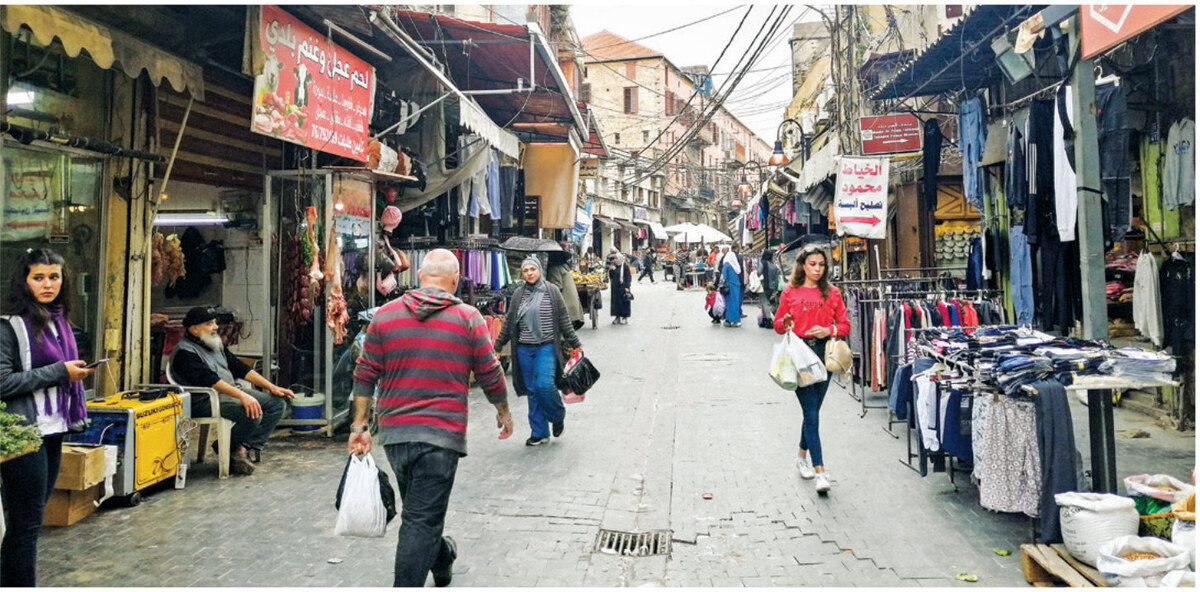LONDON: As feared, they came in their thousands, swarming into the Al-Aqsa compound in Jerusalem at the height of the week-long Jewish harvest festival of Sukkot.
On Sunday, Oct. 20, while the world’s attention was focused on the wars in Gaza and Lebanon, more than a thousand Israeli settlers occupied the Al-Aqsa compound in Jerusalem. Over the next two days, thousands more followed.
Inside, protected by police who prevented Muslims from entering, they performed Jewish religious rituals in defiance of the longstanding status quo at the Haram Al-Sharif, known to Jews as the Temple Mount.

A member of the Israeli security forces and Palestinians waiting near the Lion's Gate scuffle as they wait to enter the Al-Aqsa mosque compound to attend the last Friday noon prayer of Islam's holy fasting month of Ramadan, on April 5, 2024. (AFP)
The forced entries over three days, the latest in a series of provocative acts orchestrated by far-right Israeli National Security Minister Itamar Ben Gvir, came as no surprise to Ir Amim, an Israeli human rights organization that works “to render Jerusalem a more equitable and sustainable city for the Israelis and Palestinians who share it.”
On the eve of the Jewish High Holiday season, Ir Amim (“City of Nations” in Hebrew) issued a report revealing that 2024 was already “a record year in terms of the scope and severity of Israel’s violations of the status quo on the Mount.”
It warned that the situation “is particularly dangerous given that undermining the status quo on the Haram Al-Sharif/Temple Mount is liable to escalate into another front of violence” and added that the Israeli government’s “distorted priorities regarding the management of the war in Gaza and the north are also reflected in its conduct on the Haram Al-Sharif/Temple Mount.”
FASTFACTS
• Jews, other non-Muslims may visit Al-Aqsa compound in East Jerusalem, but may not pray there or display religious symbols.
• In recent years, the restrictions have been increasingly flouted by hardline religious nationalists, prompting violent reactions.
In January 2023, nine months before the Oct. 7 attack on Israel, Ben Gvir staged one of his controversial visits to the site, ignoring warnings from other Israeli politicians that he risked provoking violence and saying that he would not “surrender to the threats of Hamas.”
According to Hamas, it was repeated provocations such as those orchestrated by Ben Gvir that led to the Oct. 7 attack, which it codenamed “Operation Al-Aqsa Flood.” About 1,200 Israelis were killed and some 250 others kidnapped during the coordinated attack by Palestinian militant groups. The subsequent Israeli military retaliation has, according to Gaza’s Health Ministry, left nearly 42,000 Palestinians dead and more than 92,000 injured.

Israeli men pray on the Mount of Olives overlooking the Al-Aqsa mosque compound, where Muslim devotees participate in their Friday Noon prayer, in Jerusalem on March 29, 2024. (AFP)
Resolving the thorny status of Jerusalem is viewed as an important prerequisite to peace. On Monday, Arab and Muslim leaders concluded a landmark summit in Riyadh with a unified demand for Israel to withdraw from all occupied Palestinian territories.
The summit’s closing statement stressed that East Jerusalem is the “eternal capital of Palestine,” and rejected any Israeli decisions aimed at “Judaizing” it, considering such measures “null, void and illegitimate under international law.”
The leaders of 57 nations said they considered “Al-Quds Al-Sharif a red line for the Arab and Islamic nations,” and reaffirmed their “absolute solidarity in protecting the Arab and Islamic identity of occupied East Al-Quds and in defending the sanctity of the holy Islamic and Christian sites therein.”

Israeli police take position during clashes with Palestinians on Laylat al-Qadr during the holy month of Ramadan, at Jerusalem's Old City, May 8, 2021. (REUTERS)
For Muslims, the mosque compound is the third-holiest site in Islam. As the Temple Mount, it also holds great significance for Jews, who believe it was the site of both the First Temple, destroyed by Babylon’s King Nebuchadnezzar II in 587 B.C., and the Second Temple, built in the first century B.C. and destroyed by the Romans in A.D. 70.
For decades, a delicate status quo has preserved the balance of interests at the site, which has been a waqf — an Islamic religious endowment — since the 12th century. Since 1948, the site has been managed by the Jordanian-appointed Jerusalem Islamic Waqf and Al-Aqsa Mosque Affairs Council, known simply as the Waqf.
By international agreement, the Waqf has retained responsibility for the site ever since, although since the occupation of the Old City of Jerusalem by Israel after the Six Day War in 1967, Israeli forces have controlled access to it.

Challenging the status quo on the Temple Mount is a dangerous, unnecessary, and irresponsible act, says Yoav Gallant, Israel’s former defense minister. (AFP)
The compound has always been open for Jews to visit during specified hours, but they are not allowed to pray there or display religious symbols.
Ironically, said Daniel Seidemann, an Israeli lawyer and founder of nongovernmental organization Terrestrial Jerusalem, it was Israeli Prime Minister Benjamin Netanyahu who “best defined this core understanding in 2015 when he said: ‘Muslims pray at the Temple Mount; non-Muslims visit the Temple Mount’.”
Seidemann added: “Until 2017, Netanyahu reasonably maintained the status quo. But since then, he has incrementally allowed Jewish prayer, while disingenuously asserting that Israel is committed to maintaining the status quo.
“That was, and is, a lie.”

Israeli police confronts Palestinians at al Aqsa mosque compound in Jerusalem, Monday, Feb. 18, 2019. (AP)
The UN Security Council has repeatedly had cause to rebuke Israel for undermining the status quo, and last month the Waqf issued a joint statement with the Supreme Islamic Authority and the Palestinian Fatwa House accusing Israel of an “extremely dangerous escalation” by allowing settlers free rein in the compound.
In the past, said Seidemann, “many hundreds of Israelis, many Jewish, visited the mosques daily without incident. They came as guests and were treated as guests.
“But today’s visitors are best represented by Ben Gvir. He visits as the proprietor and treats the Muslims as his tenants.
“Jewish visits to the Mount no longer have anything to do with piety, and everything to do with ultra-nationalist religious triumphalism.”
He added: “Commencing with the new Netanyahu government, the veil has been ripped away. The violation of the status quo is both so blatant and consistent it cannot be denied.”
During Ramadan this year, “some of these new developments were temporarily suspended. That required a lot of discrete negotiations, leading to public safety being vested in security people with cool heads and steady hands.
“This year, as an exception, it was the quietest Ramadan in memory. Nothing stabilizes Jerusalem as much as the pursuit of the status quo in good faith.”
But following the end of Ramadan in April, said Ir Amim researcher Aviv Tatarsky, “Israel again imposed harsh restrictions on Muslim entry to Al-Aqsa, reverting to the unprecedented measures implemented after Oct. 7 and the subsequent outbreak of the war.”
Muslim worshippers under the age of 40 “are consistently denied access to the Mount by the police, even during Muslim prayer times.
“The most stringent restrictions are imposed during Jewish visits, which ultimately translates into a ban on Muslim entry while Jews conduct prayer unencumbered on the Mount.”
This systematic exclusion of Muslims from their place of worship during Jewish visits, he said, “is not only a breach of Muslim worship rights and the status quo, but also contributes to heightened tensions in an already volatile climate.”
According to Ir Amim, this past year there has been an up to 20 percent increase in the number of Jewish visits to the Mount, with over 50,000 recorded since the beginning of the Hebrew year in September 2023, surpassing the previous annual record.
But this figure refers to the number of visits, and not unique visitors, and what it reflects is an increasing number of visits primarily by “a small, albeit vocal, segment of the population alongside government supporters,” pushing for an increased Jewish presence on the Mount.
“This reality directly contradicts the Israeli government’s attempts to justify changes to the arrangements as a result of ‘pressure from below’,” said Tatarsky.
“The vast majority of the Jewish public remains uninterested in praying at the Holy Compound, while the erosion of the status quo is entirely the work of the government in service to a fringe extremist group.”
Israel’s Heritage Ministry recently announced its intention to fund Jewish visits to the compound with a budget of 2 million shekels (about $530,000.)
“The Temple movements, which are behind the Jewish tours and visits to the Mount, require government funding to sustain their activities,” said Tatarsky.
“Thus, the new budget constitutes a calculated government effort to manufacture further challenges to the status quo, aiming to engineer the Israeli public in service to its goals.”
Ir Amim has made a number of recommendations for maintaining the status quo. These include allowing unrestricted Muslim access to the Mount and, “if the police find it difficult to manage the simultaneous presence of Muslim worshippers and Jewish visitors, the entry of Muslims should take precedence,” it says, adding: “Muslim worship rights trump non-Muslim visiting rights.”
In addition, it says, Israel must prevent any Jewish prayer or worship activity on the Mount, prohibit government ministers from speaking against the status quo and visiting the Mount, and cancel the allocation of all funds to the Jewish Temple movements.
“Even after years of activity by the Temple movements, only a small minority of the Jewish public visits the Temple Mount,” said Tatarsky. “The government is ultimately promoting the interests of a fringe extreme Jewish group, while severely harming millions of Muslim residents and Israel’s relations with Arab countries, especially Jordan.”
In the past, Jewish extremists have made no secret of their wish to destroy the mosque and replace it with a “Third Temple.” This ambition is enshrined in the Amidah, the central prayer of the Jewish liturgy, which includes the entreaty “that the Temple be rebuilt speedily in our days.”
Over the decades, the mosque has been the target of arson and bomb attacks. In 1990, 20 Muslims were killed and dozens more wounded in clashes provoked by an attempt by an extremist Jewish group to lay a symbolic cornerstone for the “Third Temple” in the Al-Aqsa compound.
In recent years, extremist groups, encouraged by Ben Gvir and other right-wing politicians, have stepped up the campaign to see a third temple built on the site. Ben Gvir, who has made multiple provocative visits to the Mount, has insisted Jews should be allowed to pray on the site, a position denounced by some Israeli politicians and rabbis.
A threat made by Ben Gvir in August to build a synagogue at the Al-Aqsa compound drew condemnations from several Israeli officials.
A statement from Netanyahu’s office reiterated that “there (was) no change” to the existing policy.

















